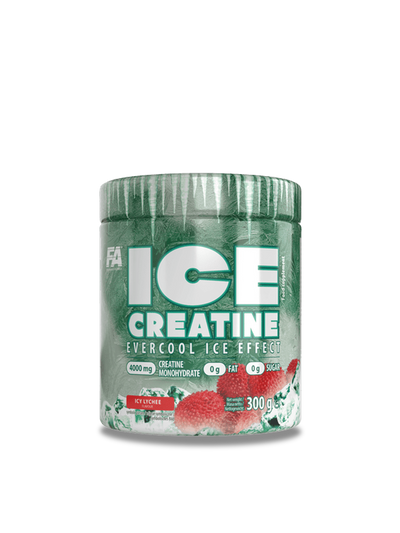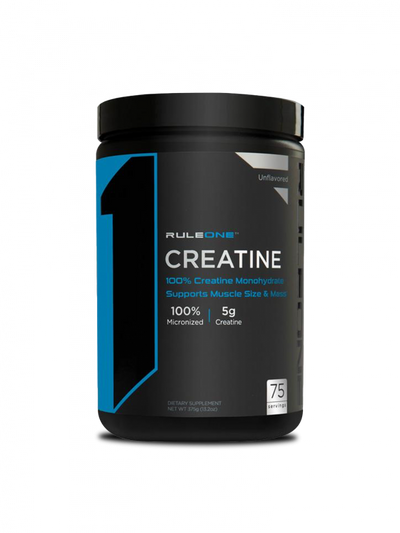Introduction
In the world of sports nutrition and supplementation, few substances have garnered as much attention and scientific support as creatine. Creatine is often hailed as the "king" of post-workout supplements due to its well-established benefits for muscle growth, strength enhancement, and overall athletic performance. In this blog post, we will take a deep dive into creatine supplementation, exploring its benefits, recommended dosage, and the profound impact it can have on strength and muscle mass.
Understanding Creatine
Creatine is a naturally occurring compound found primarily in meat and fish. It plays a crucial role in the production of adenosine triphosphate (ATP), the primary energy currency of cells, especially during short bursts of high-intensity activities like weightlifting, sprinting, and jumping.
When you supplement with creatine, you increase the body's creatine phosphate stores, which can enhance your ability to perform short-term, high-intensity efforts. This is particularly valuable for strength and power athletes, bodybuilders, and anyone engaged in explosive sports.

Benefits of Creatine Supplementation
Creatine supplementation offers a wide array of benefits that cater to athletes, bodybuilders, and fitness enthusiasts seeking to enhance their physical performance and muscle growth. Let's delve deeper into these advantages:
1. Increased Muscle Mass:
Creatine supplementation is renowned for its ability to promote muscle growth, making it a highly sought-after supplement among those aiming to build lean muscle. The mechanisms behind this benefit include:
- Enhanced Water Retention: Creatine has a hydrating effect on muscle cells. When you supplement with creatine, it increases the water content within muscle cells, resulting in a noticeable volumizing effect. While this doesn't directly increase muscle protein content, it creates a fuller appearance and can stimulate muscle growth.
- Stimulated Protein Synthesis: Creatine has been shown to upregulate muscle protein synthesis, the process by which your body builds new muscle proteins. This is essential for muscle hypertrophy (increased muscle size) and strength gains.
2. Improved Strength:
Creatine's reputation as a strength enhancer is well-founded, and numerous studies support its effectiveness in this regard. Here's how creatine boosts strength:
- Greater Muscle ATP Availability: Creatine is stored in muscle cells as creatine phosphate, a readily available source of energy for short bursts of high-intensity exercise. By increasing the muscle's creatine phosphate stores, creatine enables athletes to generate more immediate energy during strength training exercises. This, in turn, allows for heavier lifts and more repetitions, leading to strength gains over time.
- Enhanced Muscle Contraction: Creatine supplementation can improve muscle fiber recruitment and enhance the force of muscle contractions, contributing to greater strength output during workouts.
3. Enhanced Exercise Performance:
Creatine is particularly valuable for athletes and individuals engaged in sports that demand short bursts of high-intensity effort. Here's how creatine enhances exercise performance:
- Increased Power Output: Creatine enables athletes to perform at a higher intensity for longer durations. This is especially beneficial in activities like sprinting, where bursts of power are crucial for success.
- Faster Energy Regeneration: Creatine helps replenish ATP, the body's primary energy currency, more rapidly between bouts of high-intensity exercise. This means quicker recovery between sets and improved overall exercise performance.

4. Reduced Muscle Fatigue:
Creatine supplementation may help reduce the perception of muscle fatigue during intense workouts. This reduction in perceived effort can be a game-changer for athletes and fitness enthusiasts, allowing them to push through challenging sets and reach new levels of performance.
5. Faster Recovery:
Emerging research suggests that creatine supplementation may expedite the post-exercise recovery process. This can be attributed to:
- Reduced Muscle Cell Damage: Creatine may help minimize exercise-induced muscle cell damage, leading to less muscle soreness and faster recovery.
- Enhanced Glycogen Replenishment: Creatine supplementation may improve the rate at which glycogen (stored carbohydrates) is replenished in muscle tissue after exercise. This is essential for restoring energy reserves and preparing the body for subsequent workouts.
Dosage and Usage
Loading Phase (Optional):
The loading phase is an optional but commonly used method to saturate your muscles with creatine more rapidly. During this phase, you consume a higher dosage of creatine for a brief period, typically 5-7 days. Here's how it works:
- Dosage: During the loading phase, it's recommended to take approximately 20 grams of creatine per day, divided into smaller doses. For example, you might take four doses of 5 grams each throughout the day.
- Purpose: The loading phase is designed to rapidly increase the creatine content in your muscles. By doing so, you can experience the benefits of creatine sooner, especially if you want to see quick improvements in your workouts.
- Note: Some individuals may experience mild gastrointestinal discomfort during the loading phase due to the higher dosage. If this occurs, you can reduce the dosage or skip the loading phase altogether and move directly to the maintenance phase.
Maintenance Phase:
Following the loading phase, you transition to the maintenance phase, which involves a lower daily creatine intake to sustain elevated creatine levels in your muscles. Here's how to proceed:
- Dosage: During the maintenance phase, the recommended dosage is typically 3-5 grams of creatine per day.
- Purpose: The maintenance phase helps maintain the elevated creatine levels achieved during the loading phase. This ongoing supplementation ensures that you continue to benefit from creatine's effects on muscle growth and performance.
Timing:
When it comes to the timing of creatine supplementation, there are a few key considerations:
- Workout Days: It's advisable to take creatine on both workout and non-workout days to maintain consistent creatine levels in your muscles.
- Post-Workout: Many people prefer post-workout creatine supplementation. This timing is strategic because the increased blood flow to your muscles after exercise may enhance the uptake of creatine into muscle cells. However, creatine can be taken at any convenient time based on your schedule and preferences.
Forms:
Creatine is available in various forms, with creatine monohydrate being the most researched and commonly used. Here's a brief overview of common creatine forms:
- Creatine Monohydrate: This is the gold standard and the most cost-effective form of creatine. It has an extensive body of research supporting its effectiveness and safety.
- Creatine Hydrochloride (HCL): Creatine HCL is a more concentrated form of creatine that some individuals find easier on the stomach. It's often used by those who experience gastrointestinal discomfort with creatine monohydrate.
- Creatine Nitrate: Creatine nitrate is another variation that combines creatine with nitrate, which may improve its solubility and absorption. It may have different dosing requirements compared to creatine monohydrate.
Safety and Considerations
Ensuring the safe and responsible use of creatine is essential to reap its benefits while minimizing potential risks. Here's an elaboration on safety considerations and precautions when using creatine:
General Safety:
- Recommended Dosages: Staying within the recommended dosages is crucial for safety. As mentioned earlier, the loading phase typically involves higher dosages for a short period, while the maintenance phase involves lower daily doses (3-5 grams). Excessive creatine intake can lead to potential side effects.
- Consultation with a Healthcare Professional: If you have any underlying health conditions, particularly kidney issues, or if you are taking medications, it's advisable to consult with a healthcare professional before starting creatine supplementation. Certain medical conditions or medications may interact with creatine, so it's essential to get personalized advice.
Hydration:
- Increased Water Retention: Creatine may cause an increase in water retention within muscle cells. While this effect can contribute to muscle fullness and performance benefits, it's essential to stay adequately hydrated to prevent dehydration. Ensure that you drink enough water throughout the day, especially when supplementing with creatine.
- Electrolyte Balance: Proper hydration also helps maintain electrolyte balance in the body. Creatine supplementation, if not accompanied by adequate hydration, may affect electrolyte levels. Be mindful of your sodium and potassium intake, and consider consuming electrolyte-rich foods or drinks, especially during intense workouts.
Quality and Purity:
- Choose Reputable Brands: Opt for creatine supplements from reputable brands that adhere to quality and safety standards. Look for products that are third-party tested for purity and potency.
- Avoid Proprietary Blends: Some supplements may contain proprietary blends, making it challenging to determine the exact ingredients and their dosages. It's generally best to choose creatine supplements with transparent ingredient labels.
Cycling and Prolonged Use:
- Cycling Creatine: While creatine is considered safe for long-term use, some individuals choose to cycle it, meaning they take it for a specific period (e.g., 8-12 weeks) and then take a break. Cycling is a matter of personal preference and not a strict requirement.
- Individual Tolerance: People may respond differently to creatine, so it's essential to pay attention to how your body reacts. If you experience adverse effects or discomfort, consider adjusting your dosage or discontinuing use.
Special Considerations:
- Youth and Adolescents: Creatine supplementation has been studied in adults more extensively than in adolescents and children. If you are under 18 years old, consult with a healthcare professional or a qualified sports nutritionist before using creatine.
- Pregnancy and Breastfeeding: The safety of creatine supplementation during pregnancy and breastfeeding has not been thoroughly researched. Pregnant or breastfeeding individuals should consult with their healthcare provider before using creatine.
Conclusion
Creatine has earned its reputation as the "king" of post-workout supplements due to its proven ability to increase muscle mass, boost strength, and enhance athletic performance. When used as part of a well-rounded training and nutrition regimen, creatine can be a valuable tool for those looking to maximize their gains and excel in their fitness pursuits. As with any supplement, it's crucial to use creatine responsibly and in accordance with recommended dosages for optimal results and safety.








